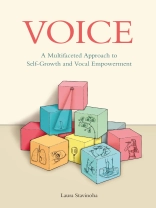VOICE mentors the self-examination of your voice and the related emotional processes. Once you get to know yourself, become increasingly self-aware and acknowledge your vulnerabilities as well as your talents, your voice and your message will become more powerful. As a result, you will build self-confidence, express yourself better and be heard.
Do you experience your voice as a limitation or a blockage? Do you feel that you are not always being heard? Does your voice change according to the situation you’re in? This book provides an answer to why your voice doesn’t always seem to be in your control.
Voice coach Laura Stavinoha struggled with stage fright from the age of fourteen. In this superb book she shares with you the knowledge she gained in the field of vocal development. She explains her own experiences and those of her clients within two theoretical frameworks: the polyvagal theory and the theory of positive disintegration. The exercises she offers are practical, down to earth, and will contribute to your personal development. Laura has found her voice, and offers you a guide to do the same.
Inhaltsverzeichnis
Foreword by Lotte van Lith
Introduction
Part 1. Voice and…
1. Vulnerability
1.1. The Origin of Stage Fright
1.2. The Inner Critic
1.3. Your Vulnerability is Your Strength
2. Safety
2.1. The Polyvagal Theory
2.2. Four Means of Expression
2.3. How You Can Regulate Your Nervous System
3. Personal Growth
3.1. Struggling to Adapt to Society… Seeking Acceptance
3.2. Discovering My Voice… and Its Vulnerabilities
3.3. Reconnecting to Creativity…Letting Go of Everything Else
3.4. The Tumultuous Years After Seizing Agency
3.5. Reconnecting with Society-On My Own Terms
3.6. Dąbrowski and His Theory
3.7. Re-relating to Creativity and Voice
3.8. What TPD Has to Offer for the Time We Live in Now
4. Developmental Potential
4.1. Nature | The First Factor
4.2. Nurture | The Second Factor
4.3. The Third Factor
5. Overexcitabilities
5.1. What Is Overexcitability
5.2. Your Voice as Vulnerability and as Strength
5.3. Taking a Closer Look at the Sensitive Nervous System
6. Transformative Inner Forces
6.1. Unilevel vs. Multilevel Dynamisms
6.2. The Unilevel and Multilevel Development of Marvin Gaye
7. Emotions
7.1. Our Evolving Understanding of Emotion
7.2. Emotions as the Source for Values
Part 2. Work with Your Voice on a Deeper Level
8. Breathe
8.1. How Voice and Breath Are Connected
8.2. The Right Way to Breathe
8.3. Other Benefits of Healthy Breathing
9. Feel into the Body
9.1. Confidence is a Physical Experience
9.2. The Basics of Body Awareness
9.3. Building Confidence
10. Make Sense of Your Emotions
10.1. Read Your Body’s Cues
10.2. Become Introspective About What You Feel
10.3. Accept What You Feel
10.4. Don’t React, Regulate
10.5. Identify Your Unmet Needs and Values
11. Step Back from Your Thoughts
11.1. Don’t Think While You Speak
11.2. What Are Thoughts?
11.3. Three Senses of Self
11.4. Show Your Enthusiasm and Engagement to the World
11.5. Values as a Gateway to Feelings
12. Become Self-Aware, Then Transcend the Self
12.1. How Developing Awareness Helps the Voice
12.2. Contemplation
12.3. From Contemplation to Moral Development
Appendix – Two Extra Exercises
1. Take the Musician’s Approach
2. A Contemplation Exercise in Interconnectedness
Acknowledgments
Bibliography
Index
Über den Autor
My name is Laura Stavinoha, and at the moment I work as a musician, performer, writer, producer and coach, with the voice at center. I have a university master’s degree in musicology, a minor in private law and I am trained as a classical singer. After my education, I took on various professional identities: project manager, business manager, copywriter and booking agent for a voice agency. All these previous experiences turned out to be the perfect preparation for what I love doing most: coaching people with their voice, and expressing my own creativity through making music.As a vocalist, I’ve been involved in many styles: from classical to house music and from experimental to my own pop songs. In recent years I have performed a lot abroad, and released several EPs with my own compositions, which you can find on www.laurastavinoha.com. With my live looping program I have played several concert tours through Mexico and California. For years, I have studied the spoken and unspoken rules of various music styles and singing traditions, to conclude that I no longer want to conform to certain styles or singing traditions. For myself ánd for the people I coach, I aspire for an authentic, intuitive speaking or singing voice that communicates from the heart.As a voice coach, I not only have a lot of knowledge about the voice as an instrument, but I also use behavioral therapy and personality theories to put voice coaching in a broader context. The voice is one of the most direct ways to to communicate and to express yourself creatively and emotionally. Genuinely connecting with others gives me a lot of energy. I experience working with people from this same principle as creative and meaningful. Creating awareness and connection through the voice; that is what I want to contribute to this world. More on my work as a voice coach you can find at www.useyourvoice.nl












